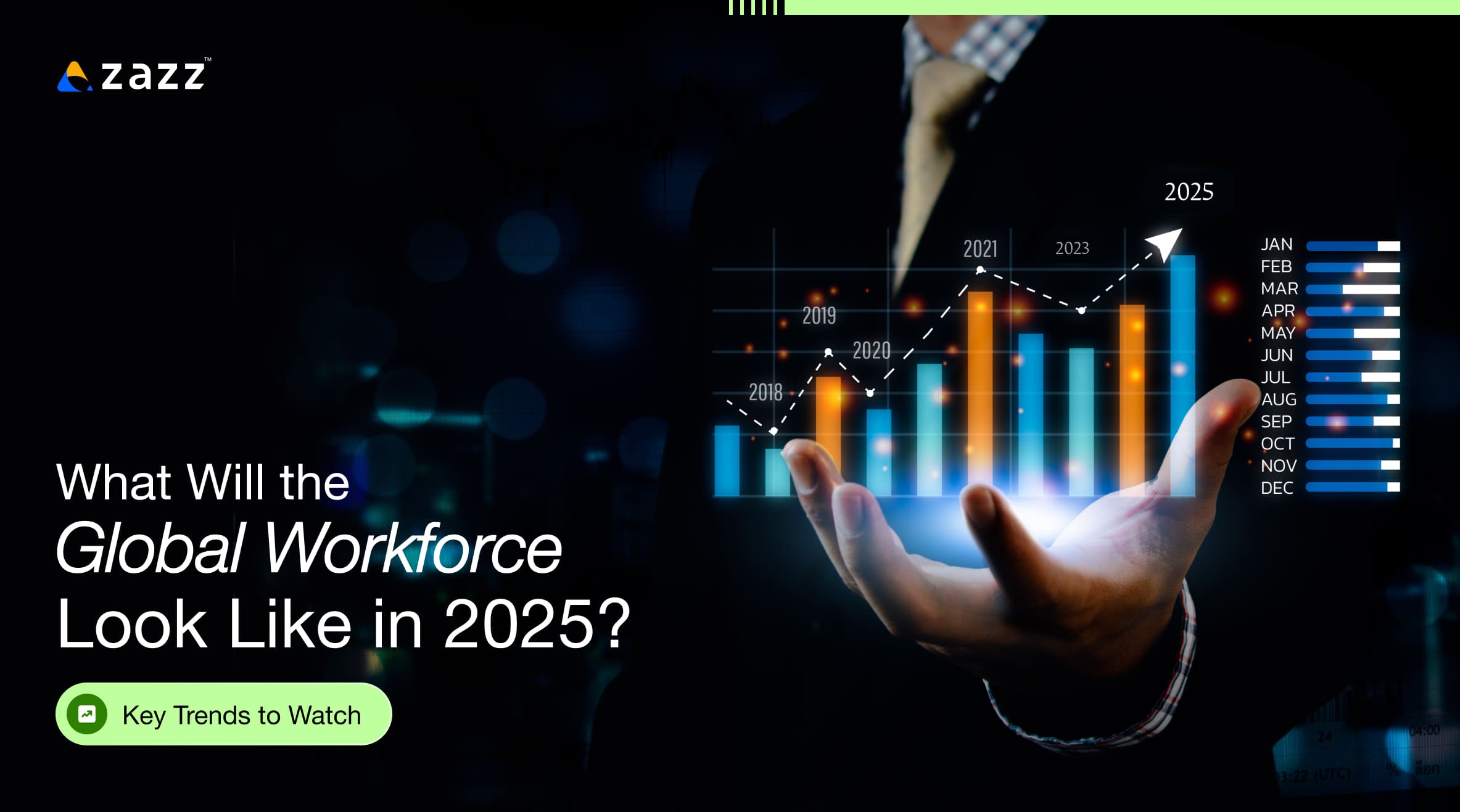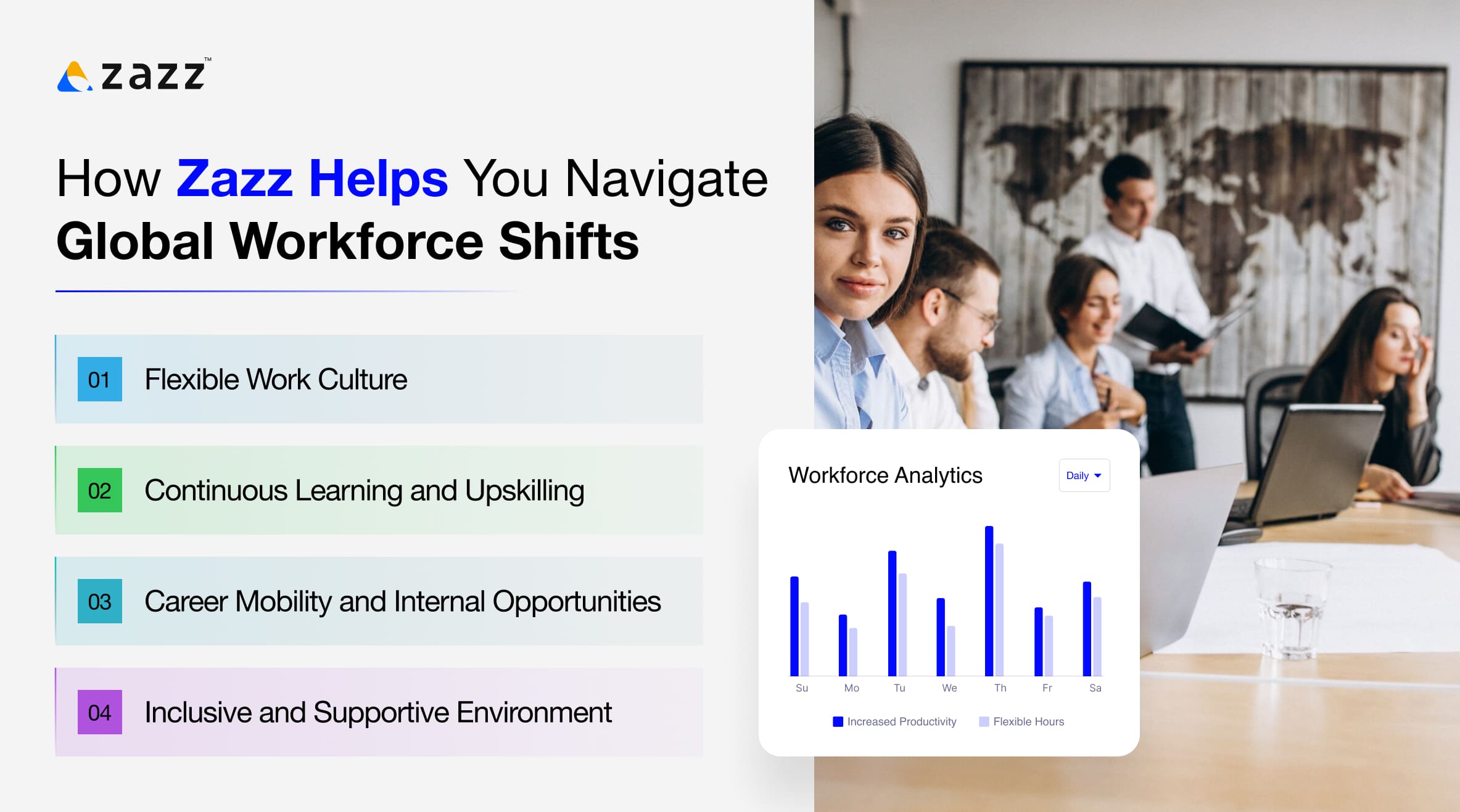
The global workforce is at a tipping point. As we move into 2025, businesses around the world are rethinking what work looks like, who does it, and where it gets done. From AI-powered tools and skills-first hiring to the rise of remote work and global mobility, the very structure of work is being reshaped.
What’s driving this transformation? It’s a blend of technological innovation, economic shifts, and changing employee expectations. Organizations are moving beyond traditional job roles and geographic boundaries, embracing flexible models and tapping into global talent pools. At the same time, employees are seeking more purpose, autonomy, and opportunities to grow.
This blog explores the key global workforce trends in 2025 and what they mean for both companies and individuals. It also highlights how forward-thinking organizations like Zazz are helping their teams adapt and thrive in this rapidly evolving world of work.
Skills and Workforce Evolution
The skill sets driving the global workforce are evolving faster than ever. In today’s tech-first, disruption-heavy economy, it’s no longer just about what you know — it’s about how quickly you can learn, adapt, and apply new knowledge.
According to the World Economic Forum’s Future of Jobs Report, 44% of workers’ core skills are expected to change by 2027. That’s a clear indicator that reskilling and upskilling will be critical over the next few years. The demand for soft skills like analytical thinking, creativity, resilience, and emotional intelligence is rising just as fast as technical skills like data analysis, AI, and cybersecurity.
These shifts are part of broader global trends in the workforce, where adaptability and continuous learning have become essential.
What’s changing:
- From Degrees to Skills: Companies are shifting from degree-based hiring to skill-based hiring. Real-world problem-solving and practical knowledge are valued more than traditional qualifications.
- Hybrid Skill sets: The most sought-after employees combine technical expertise with strong communication and collaboration abilities — especially in remote and cross-functional environments.
- Lifelong Learning: Learning is no longer confined to early career stages. Platforms like Coursera, LinkedIn Learning, and internal corporate academies are becoming the norm for continuous development.
As AI and automation take over repetitive tasks, human skills like critical thinking, decision-making, and creativity are becoming workforce cornerstones. This evolution is not just about staying relevant — it’s about staying ahead.
Related reading: How To Increase the Productivity With IT Staff Augmentation
Top 5 Key Trends Shaping the Global Workforce

The global workforce trends in 2025 will be shaped by a unique blend of innovation, shifting expectations, and new operational models. Organizations that adapt to these trends will not only survive but lead the way in the future of work. Here are the key shifts transforming the global employment landscape:
1. Skills-Based Hiring Takes the Lead
Degrees are no longer the golden ticket. Employers are now focusing more on what people can do rather than what qualifications they hold. Skills-based hiring emphasizes practical experience, adaptability, and a portfolio of real-world capabilities over traditional academic credentials.
This shift is being driven by two things: the rise of digital transformation across industries, and the growing global talent shortage. As jobs evolve faster than curriculums, employers are relying more on certifications, microlearning, and hands-on problem-solving to identify the right talent.
LinkedIn reports that 75% of recruiters now use skills-first filters when hiring, and 20% of job posts no longer require a four-year degree.
For employees, this shift makes career growth more accessible than ever. It’s no longer about formal diplomas, but about continuous learning and proven, real-world expertise.
2. Remote Work Goes Global and Permanent
What started as a necessity during the pandemic has now become a long-term strategy. Remote and hybrid work models are here to stay, but they’re evolving into something bigger: the rise of the borderless workforce.
In 2025, companies are hiring talent from across countries and time zones, thanks to flexible policies and digital collaboration tools. For organizations, this unlocks new talent markets. For employees, it means greater access to opportunities, regardless of geography.
Distributed and global teams have become a key part of workforce design, improving satisfaction, retention, and diversity.
It’s no longer just about flexibility; it’s about inclusion, accessibility, and reimagining what “the workplace” truly means.
3. AI Isn’t Replacing You — It’s Working With You
Artificial Intelligence is no longer just a buzzword. It’s integrated into daily workflows, streamlining recruitment, analyzing data, and automating repetitive tasks.
But instead of replacing human workers, AI is enhancing productivity and encouraging collaboration between man and machine. Professionals who understand how to work alongside AI tools, whether for design, analytics, or operations, are gaining a distinct advantage.
McKinsey estimates that up to 30% of global work hours could be automated by 2030. This will create new room for high-value, creative, and strategic roles. In this new landscape, tech fluency is becoming just as important as traditional job experience.
4. Employee Wellbeing Becomes Top Priority
Employee expectations are changing. Today’s workforce wants more than just a paycheck. They seek purpose, flexibility, and support for their mental and emotional health.
Organizations are responding by embedding wellness into their core strategy: through remote options, mental health programs, paid wellness days, and inclusive company cultures.
According to a report, 81% of employees expect employers to actively support their mental health needs. Companies that don’t may struggle to attract and retain top talent.
In 2025, wellbeing isn’t a nice-to-have — it’s a competitive advantage.
5. Data-Driven Workforce Planning Takes Center Stage
In a rapidly changing job market, intuition is no longer enough. Businesses are leveraging real-time data and AI tools to make smarter workforce decisions, from hiring and training to engagement and retention.
This shift enables organizations to spot trends early, identify skills gaps, personalize employee experiences, and align talent strategies with business goals.
Still, Deloitte found that only 19% of companies feel fully equipped to use workforce data effectively. This highlights a massive opportunity for growth.
For companies that embrace data, the future offers a more agile, transparent, and impactful way of managing people.
Related reading: Staff Augmentation Trends in E-commerce
Impact of Global Workforce Trends
The transformation of the global workforce is reshaping the way organizations, individuals, and economies operate. Here’s how these global workforce trends are making an impact:
1. For Businesses
Companies must rethink how they attract, engage, and retain talent. With teams distributed across borders, traditional approaches to management and culture-building are evolving. Investing in digital tools, flexible policies, and personalized employee experiences is now essential to foster connection and productivity in a remote-first world.
2. For Employees
Workers are expected to embrace continuous learning and adapt to shifting roles. The demand for digital fluency, soft skills, and cross-functional capabilities is growing. Career agility — the ability to pivot, reskill, and seize new opportunities — has become a key differentiator in a competitive, global talent market.
3. For Economies
Governments and policymakers face the challenge of adapting labor laws and social protections to reflect new ways of working, including gig work, remote jobs, and AI-driven roles. Supporting inclusive growth, fair compensation, and worker well-being in a borderless digital economy is more important than ever.
How Zazz Helps You Navigate Global Workforce Shifts

At Zazz, we understand that the evolving global trends in the workforce can be both exciting and overwhelming. Whether you’re adapting to remote work, exploring global opportunities, or navigating the rise of automation, we’re here to support your journey every step of the way.
1. Flexible Work Culture
We empower you to work from where you thrive. With flexible hours, remote options, and tools that support seamless collaboration, Zazz enables you to balance personal goals with professional growth, no matter where you’re located.
2. Continuous Learning and Upskilling
As roles evolve, so do your skills. We offer ongoing learning programs, mentorship, and access to the latest tools and technologies. From technical certifications to leadership development, Zazz invests in your long-term growth and adaptability.
3. Career Mobility and Internal Opportunities
At Zazz, career growth isn’t limited by geography or job titles. We encourage internal mobility and cross-functional experiences that align with your aspirations. Our borderless approach to talent ensures you’re recognized for your potential, not just your location.
4. Inclusive and Supportive Environment
We prioritize inclusion, well-being, and a culture of belonging. Through open communication, mental health support, and employee resource groups, Zazz ensures you feel connected and valued.
Related reading: Impact of Staff Augmentation on Employee morale
Conclusion
The global workforce trends in 2025 are dynamic, digital, and increasingly decentralized. As technology accelerates, employee expectations evolve, and traditional work models give way to more flexible, skills-first approaches, both businesses and individuals must adapt.
Staying ahead in this changing environment means embracing lifelong learning, leveraging AI as a collaborative tool, prioritizing wellbeing, and tapping into global talent. Forward-thinking organizations like Zazz are not just adjusting to these changes; they’re empowering employees to thrive within them.
Ready to be part of the future of work? Join a team that’s changing the game and explore amazing opportunities at Zazz!
Frequently Asked Questions
Key global workforce trends include skills-based hiring, the rise of remote and borderless work, the integration of AI in daily tasks, increased focus on employee wellbeing, and data-driven workforce planning.
Remote work has shifted from a temporary solution to a permanent strategy. It’s now about inclusion, global collaboration, and accessing talent across borders, supported by advanced digital tools and flexible policies.
As job roles evolve rapidly due to technology, employers are placing more emphasis on practical skills, real-world experience, and adaptability rather than traditional degrees or qualifications.
By embracing lifelong learning, developing hybrid skill sets (technical + soft skills), and staying adaptable. Leveraging platforms like Coursera, LinkedIn Learning, and company-sponsored training can help.
Zazz provides a flexible work culture, continuous learning opportunities, internal career mobility, and a strong focus on inclusion and wellbeing, helping employees stay ahead in a transforming world of work.
Recent Articles
Table of Content 1. Skills and Workforce Evolution 2. Top...
Table of Content 1. Data Engineer vs. Data Scientist: Understanding...
Table of Content 1. What is the Carnival in Brazil?...












